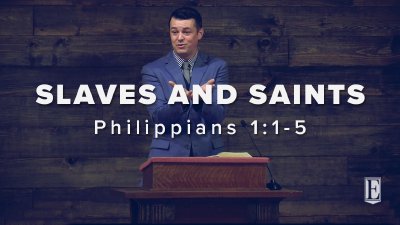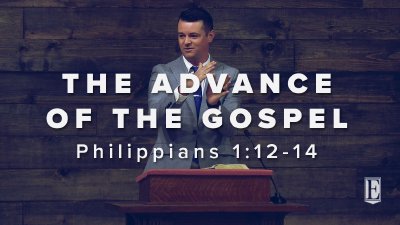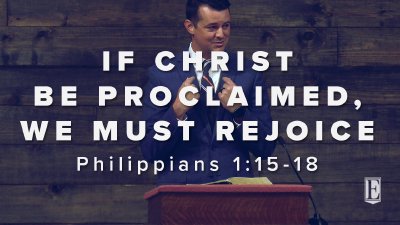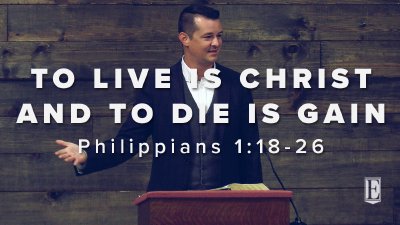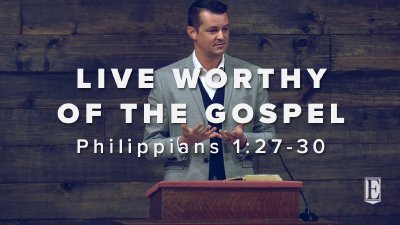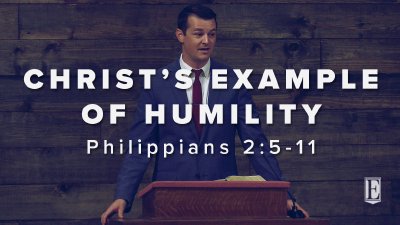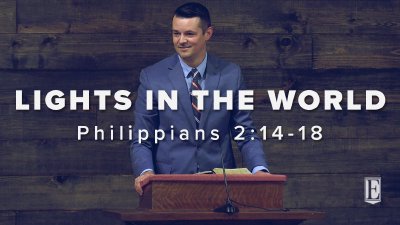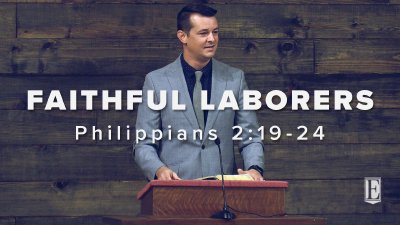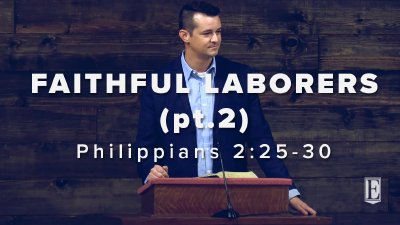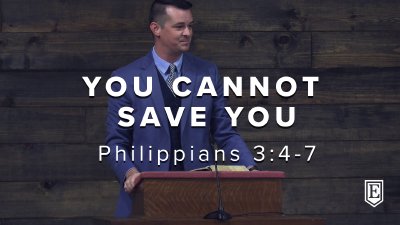


Philippians 2020
The surpassing worth of knowing Christ
SLAVES AND SAINTS: Philippians 1:1-5
May 31, 2020 • Brett Baggett
OUTLINE I. The Slaves who wrote it (v. 1) II. The Saints who received it (v. 1, 3-5) III. The Source of their every need (v. 2) DISCUSSION I. Who is the author of this letter according to verse 1? What do we learn about Paul from Acts chapter 26? Who is with Paul as he writes? What do we learn about Timothy from Acts 16:1-5, Romans 16:21, 1 Corinthians 4:17, 2 Corinthians 1:19, 1 Thessalonians 3:2, 1 Timothy 1:2, and 2 Timothy 1:2? II. What title does Paul give both himself and Timothy in verse 1? What does this word mean? How should this help us understand a key component of the Christian life? III. Who is Paul writing to according to the second half of verse 1? What title does he give them and what does that word mean? How should this make us joyful? Where do these “saints” reside? What do we learn about the origins of the church at Philippi in Acts 16:6-40? IV. Which two church offices does Paul mention in verse 1? How does 1 Timothy 3:1-13 shed light on these offices? What do we learn about Church government in verse 1? V. What does Paul want the saints at Philippi to receive, according to verse 2? What do these words mean? Who is the source of this “grace…and peace”? VI. What do we learn about Paul and the Philippians in verses 3-5?
HE WILL BRING IT TO COMPLETION: Philippians 1:6-7
June 7, 2020 • Brett Baggett
OUTLINE I. The certainty of our glorification (v.6) II. The rightness of our confidence (v.7a) III. The strength to stare down affliction (v.7b) DISCUSSION I. What is Paul sure of in verse 6? Who is the “he” in verse 6? What will “he” do? What does Paul mean by “began a good work in you”? What does he mean by “will bring it to completion”? What is “the day of Jesus Christ”? How does Romans 8:28-30 help clarify? II. In verse 7, why does Paul say “It is right for me to feel this way about you”? *hint. Notice the word “because.” What does Paul mean by “I hold you in my heart”? How does 2 Corinthians 7:2-4 help clarify? What do you think Paul means by “for you are all partakers with me of grace, both in my imprisonment and in the defense and confirmation of the gospel”?
PAUL'S PRAYER: Philippians 1:8-11
June 14, 2020 • Brett Baggett
OUTLINE I. The Basics of our Sanctification (v.8-10) II. The Fruit of our Sanctification (v.11a) III. The Source of our Sanctification (v.11b) IV. The Goal of our Sanctification (v.11c) DISCUSSION I. What does Paul pray for according to verse 9? What do these words mean? Is this like or different than typical prayer requests you have witnessed? How can you better pray like the Holy Spirit guides us to in the Bible rather than how our flesh would guide us to? II. What does Paul desire to come about from answered prayer, according to verse 10? *hint: notice the words “so that.” What do these words mean in verse 10? What is “the day of Christ”? III. According to verse 11, what does Paul desire the Philippians to be filled with? What does he mean? How can Galatians 5:22-24 help clarify? Where does this “fruit of righteousness” come from? Why does it come through faith alone in Jesus Christ alone, according to the last part of verse 11?
THE ADVANCE OF THE GOSPEL: Philippians 1:12-14
June 21, 2020 • Brett Baggett
OUTLINE I. Jesus advances the gospel through us as we suffer for His name's sake (v. 12-13) II. Jesus advances the gospel through us as we are confident in Him (v. 14a) III. Jesus advances the gospel through us as we boldly speak the word of God without fear (v. 14b) APPLICATION I. Whatever comes your way, learn to see it not as an obstacle but as an opportunity to proclaim the ultimate value of Christ Jesus. II. Jesus’ plans are always better than our plans. III. Suffering with joy as you proclaim the Gospel is the best way to show the magnificent worth of knowing Jesus. IV. Look at the example of others whom Jesus has used to suffer for the sake of the gospel, and become more confident and bold by their example—see how God sustained them to be faithful and worked mightily through them. V. Good words are the seeds and good works the fertilizer that we scatter and water; God causes the growth. DISCUSSION I. What does Paul want his brothers and sisters in Christ to know, according to verses 12-13? What is he referring to when he says “what has happened to me”? What has his imprisonment produced in the “imperial guard”? Who is this all “for” according to the end of verse 13? What can we learn here concerning how Jesus advances the gospel in the world? II. What did Paul’s suffering for Jesus’ sake do to “most of the brothers” according to the first part of verse 14? This is crucial: who are they confident “in”? What can we learn here concerning how Jesus advances the gospel in the world? III. According to the second part of verse 14, what did this “confidence in the Lord” result in? What can we learn here concerning how Jesus advances the gospel in the world?
IF CHRIST BE PROCLAIMED, WE MUST REJOICE: Philippians 1:15-18
June 28, 2020 • Brett Baggett
OUTLINE I. Some preach Christ from envy and rivalry— from selfish ambition. II. Some preach Christ from good will—from love. III. Paul rejoices, no matter the affliction his detractors try to cause him, because Christ is proclaimed. APPLICATION I. You can believe and preach every doctrine perfectly and still be full of vices—still be in sin. II. You can be as loving and sincere as an angel and still be cursed by God if you get the gospel wrong. III. If Christ be proclaimed truly, we must rejoice fully. IV. If you treasure Jesus, you will not care about your own reputation because you are too concerned with His. DISCUSSION I. What are the two groups of gospel preachers Paul lists in verse 15? What do these words mean? What can we learn from this? II. Why do those who preach the gospel “from good will” do what they do, according to verse 16? Why do those who preach the gospel “from envy and rivalry” do what they do, according to verse 17? What do these words mean? What can we learn from this? III. In verse 18a, how does Paul respond to these two groups of gospel preachers? Does this mean Paul does not care about the particulars of the gospel message? How does Galatians 1:6-9 help clarify? Therefore, what does Paul mean and what does he not mean here in Philippians 1:18a?
TO LIVE IS CHRIST AND TO DIE IS GAIN: Philippians 1:18-26
July 5, 2020 • Brett Baggett
OUTLINE I. The Christian life is to be lived always rejoicing (v .18) II. The Christian life is to be lived with assurance of deliverance (v. 19) III. The Christian life is to be lived unashamed and full of courage for Jesus' glory (v. 20) IV. The Christian life is be lived and died with Jesus as the prize (v. 21-26) DISCUSSION I. According to verse 18b how is this Christian life to be lived? How does 2 Corinthians 6:10 help clarify? II. What does Paul “know” in verse 19? What can we learn here concerning how the Christian life is to be lived? III. According to verse 20, what is Paul’s “eager expectation and hope”? Why does Paul want to be “[unashamed]…with full courage” according to the last part of verse 20? What does it mean for “Christ to be honored in my body”? IV. What does Paul mean in verse 21? How do verses 22-25 help clarify? Restate verse 21 in your own words, paraphrasing what Paul is meaning here.
LIVE WORTHY OF THE GOSPEL: Philippians 1:27-30
July 12, 2020 • Brett Baggett
OUTLINE We must live worthy of the gospel I. We live worthy of the gospel when we stand firm together (v.27a) II. We live worthy of the gospel when we stand firm together…striving side by side for the truth of the gospel (v.27b) III. We live worthy of the gospel when we stand firm together…not frightened by opponents (v.28) IV. We live worthy of the gospel when we stand firm together…suffering for Jesus' sake (v.29-30) DISCUSSION I. According to verse 27, how will “our manner of life be worthy of the gospel of Christ”? What does Paul mean by “striving side by side for the faith of the gospel”? How does Jude 3 help clarify in what sense Paul uses the word “faith” here? II. In verse 28, what is another clear way we “let [our] manner of life be worthy of the gospel of Christ”? What is a “clear sign” to someone of their “destruction”? What is a “clear sign” to someone of their “salvation”? Who is the salvation from? III. According to verse 29, what has been granted to Christians? How should the gift of faith assure you of God’s love? How should the gift of suffering for Jesus’ sake strengthen you in afflictions? IV. What is this conflict of which Paul writes in verse 30? What can we learn from this?
CONSIDER OTHERS MORE SIGNIFICANT: Philippians 2:1-5
July 19, 2020 • Brett Baggett
OUTLINE I. If we are in Christ, we must be united (v. 1-2) II. If we would be united, we must humble ourselves (v. 3b) III. If we would humble ourselves, we must avoid self ambition and conceit (v. 3a) IV. If we would humble ourselves, we must count others more significant (v. 3c-4) V. We humble ourselves for Christ because He humbled Himself for us (v. 5) DISCUSSION I. What does Paul hope to see in the lives of these Philippian Christians according to verse 1? What do each of these mean? II. According to verse 2, what will “complete [Paul’s] joy”? What does it mean to “[be] of the same mind”? What does it mean to “[have] the same love”? What does it mean to “[be] in full accord and of one mind”? III. Humility is truly the theme of verses 1-4. What will the humble Christian’s life look like according to verse 3? What does “selfish ambition” mean? What does “conceit” mean? Do you count others more significant than yourself? If not, how can you start? If so, how can you grow in that grace? IV. What is Paul not saying in verse 4? What is he saying? Look ahead to verses 5-7. What is the root of such humility?
CHRIST'S EXAMPLE OF HUMILITY: Philippians 2:5-11
July 26, 2020 • Brett Baggett
OUTLINE I. THE HUMILIATION OF JESUS I) Jesus humbled Himself by releasing His divine rights (v. 6) II) Jesus humbled Himself by emptying Himself (v. 7a) III) Jesus humbled Himself by taking the form of a servant (v. 7b) IV) Jesus humbled Himself by obeying His Father in life and death (v. 8) II. THE EXALTATION OF CHRIST I) Jesus is exalted now (v. 9) II) Jesus will receive His final reward (v. 10-11) DISCUSSION I. Read verse 5. In what sense does Paul use the word “mind”? What does Paul mean by “Have this mind among yourselves, which is yours in Christ Jesus”? How do Romans 15:3 and Matthew 11:29 help clarify? II. Read verses 6-7. What do we learn about Jesus in these verses? What does Paul mean by “he was in the form of God”? How does John 5:18 help clarify? In what sense did Jesus “[empty] himself”? How does the following part of the verse help clarify what he does and does not mean? III. According to verse 8, what is the pinnacle of Jesus’ humility? Why did Jesus “[humble] himself by becoming obedient to the point of death, even death on a cross”? How does this stir your love for Jesus and encourage you to humble yourself? IV. “Therefore” what has God the Father done because of Jesus’ humility, according to verses 9-11? What will every single person eventually do before Christ? To what end will they “bow” and “confess that Jesus Christ is Lord”? What does Paul mean by “bow” and “confess”? Do you “bow” before Jesus? Do you “confess that Jesus Christ is Lord, to the glory of God the Father”?
WORK, FOR IT IS GOD WHO WORKS IN YOU: Philippians 2:12-13
August 2, 2020 • Nate Yarbrough
DISCUSSION I. In light of Christ’s humility by which he saved us, what does Paul command in verse 12? How does Hebrews 5:8-9 help clarify? II. How do Romans 8:12-13 and 2 Corinthians 5:5 help us understand how we “work out our own salvation with fear and trembling”? III. According to verses 13, who is it that is working in us as we “work out [our] own salvation with fear and trembling”? To what end is God working in us according to the last part of verse 13? IV. What danger do we fall into if we live only according to verse 12? What danger do we fall into if we live only according to verse 13?
LIGHTS IN THE WORLD: Philippians 2:14-18
August 9, 2020 • Brett Baggett
OUTLINE How must we live in this crooked and twisted generation? We must live as shining lights (v. 15) I. If we would be lights in the world we must not grumble or dispute (v. 14) II. If we would be lights in the world we must hold fast and hold forth the word of life (v. 16) III. If we would be lights in the world we must pour ourselves out for others (v. 17) IV. If we would be lights in the world we must be glad and rejoice (v. 18) DISCUSSION I. What things are we commanded to do “without grumbling or disputing” in verse 14? What does Paul mean by “grumbling”? What does Paul mean by “disputing”? II. To what end are we to “do all things without grumbling or disputing” according to verse 15? How does Paul describe the public witness of the Christian? How does Paul describe those not united to Christ by faith? III. According to verse 16, what must we “[hold] fast to” if we are going to live “as lights in the world”? What does Paul mean by “so that in the day of Christ I may be proud that I did not run in vain or labor in vain”? IV. According to verses 17-18, what else marks the Christian life besides “[shining] as lights in the world”? What does Paul mean by “poured out as a drink offering”? How should this encourage you as you suffer for Jesus’ sake? What does Paul say we “should be” in verse 18?
FAITHFUL LABORERS: Philippians 2:19-24
August 16, 2020 • Brett Baggett
OUTLINE INTRO: The harvest is plentiful but the laborers are few (v. 20a) What do faithful laborers look like? I. Faithful laborers are concerned with the welfare of the saints (v. 20b) II. Faithful laborers have real affection for the saints (v. 19, 23-24) III. Faithful laborers seek Jesus' interests (v. 21) IV. Faithful laborers are servants (v. 22) DISCUSSION I. Read verses 19-20. What do we learn about Timothy and therefore about faithful gospel ministry? What do we learn about unfaithful gospel ministry from verse 21? II. According to verse 22, how did Paul view Timothy? Why? What did Paul “therefore” want Timothy to do, according to verses 23-24?
FAITHFUL LABORERS (pt.2): Philippians 2:25-30
August 23, 2020 • Brett Baggett
OUTLINE I. THE IDENTITY OF A FAITHFUL LABORER (v. 25) I) A faithful laborer is a brother (v. 25a) II) A faithful laborer is a fellow worker (v. 25b) III) A faithful laborer is a fellow soldier (v. 25c) IV) A faithful laborer is a messenger (v. 25d) V) A faithful laborer is a minister (v. 25e) II. THE HEART OF A FAITHFUL LABORER (v. 26-27, 30) I) The heart of a faithful laborer longs for the saints (v. 26a) II) The heart of a faithful laborer distresses over the saints (v. 26b-27) III) The heart of a faithful laborer is willing to risk his life for the saints (v. 30) III. HOW FAITHFUL SAINTS TREAT FAITHFUL LABORERS (v. 26, 28-29) I) Faithful saints are concerned with the welfare of faithful laborers (v. 26) II) Faithful saints receive faithful laborers with all joy (v. 29a) III) Faithful saints honor faithful laborers (v. 29b) DISCUSSION I. Read verses 25-27. What do we learn about Epaphroditus and therefore about faithful gospel ministry? II. According to verse 25, how did Paul view Epaphroditus? According to verse 27, how did Paul feel about Epaphroditus? What do we learn about faithful gospel ministry from verse 30?
TRUE AND FALSE CHRISTIANS: Philippians 3:1-3
August 30, 2020 • Brett Baggett
OUTLINE I. TRUE CHRISTIANS REJOICE IN THE LORD (v.1a) II. TRUE CHRISTIANS LOOK OUT FOR FALSE CHRISTIANS (v.1b-2) I) You must look out for those that teach salvation by works (v.2a) II) You must look out for those that brag about themselves (v.2b) III) You must look out for those that make a big deal of outward signs (v.2c) III. TRUE CHRISTIANS HAVE HAD THEIR HEARTS CHANGED BY GOD (v.3a) IV. TRUE CHRISTIANS WORSHIP GOD BY THE SPIRIT OF GOD (v.3b) V. TRUE CHRISTIANS BRAG ABOUT CHRIST JESUS ALONE (v.3c) VI. TRUE CHRISTIANS PUT NO CONFIDENCE IN THEMSELVES (v.3d) DISCUSSION I. After giving the Philippian Christians many commands, as well as setting before them the shining examples of Timothy and Epaphroditus, what does Paul “finally” command in verse 1? Why do you think he says, “To write the same things to you is no trouble to me and is safe for you”? What should we learn from this repetition? II. Next, Paul turns but briefly to warn the Philippians of the false apostles that they are no doubt already aware of. *note the brevity of his warnings concerning these false teachers. If they were truly a threat to the Philippians Paul would have undoubtedly spent more time writing about them as he did to the Galatians. What does he call them in verse 2 and what do these terms indicate? How are true believers (“we”) contrasted with these false teachers in verse 3? According to the last part of verse 3, what marks all true believers in Jesus Christ? Do you put “confidence in the flesh” or do you “glory in Christ” alone “by the Spirit of God”?
YOU CANNOT SAVE YOU: Philippians 3:4-7
September 6, 2020 • Brett Baggett
OUTLINE If anyone could justify themselves through their privileges or achievements, it was Paul (v. 4). I. Your religious actions cannot save you (v. 5a) II. Your family cannot save you (v. 5b) III. Your rule keeping cannot save you (v. 5c) IV. Your passion cannot save you (v. 6a) V. Your own righteousness cannot save you (v. 6b) You can only be saved by counting all of your privileges and achievements as loss and trusting in Christ alone (v. 7). DISCUSSION I. What is Paul getting at in verse 4? Read verses 5-6. In what ways does Paul show that if anyone were to have “confidence in the flesh” it would be him? What do all of these things mean? Is your experience consistent with Paul or do you find yourself in a different place when looking at your life? II. After Paul details all of the “gain” he had—reasons he has to place “confidence in the flesh”—what conclusion does he come to in verse 7? Can you, with Paul, say “I count everything as loss for the sake of Christ”? How is this the path to true joy?


